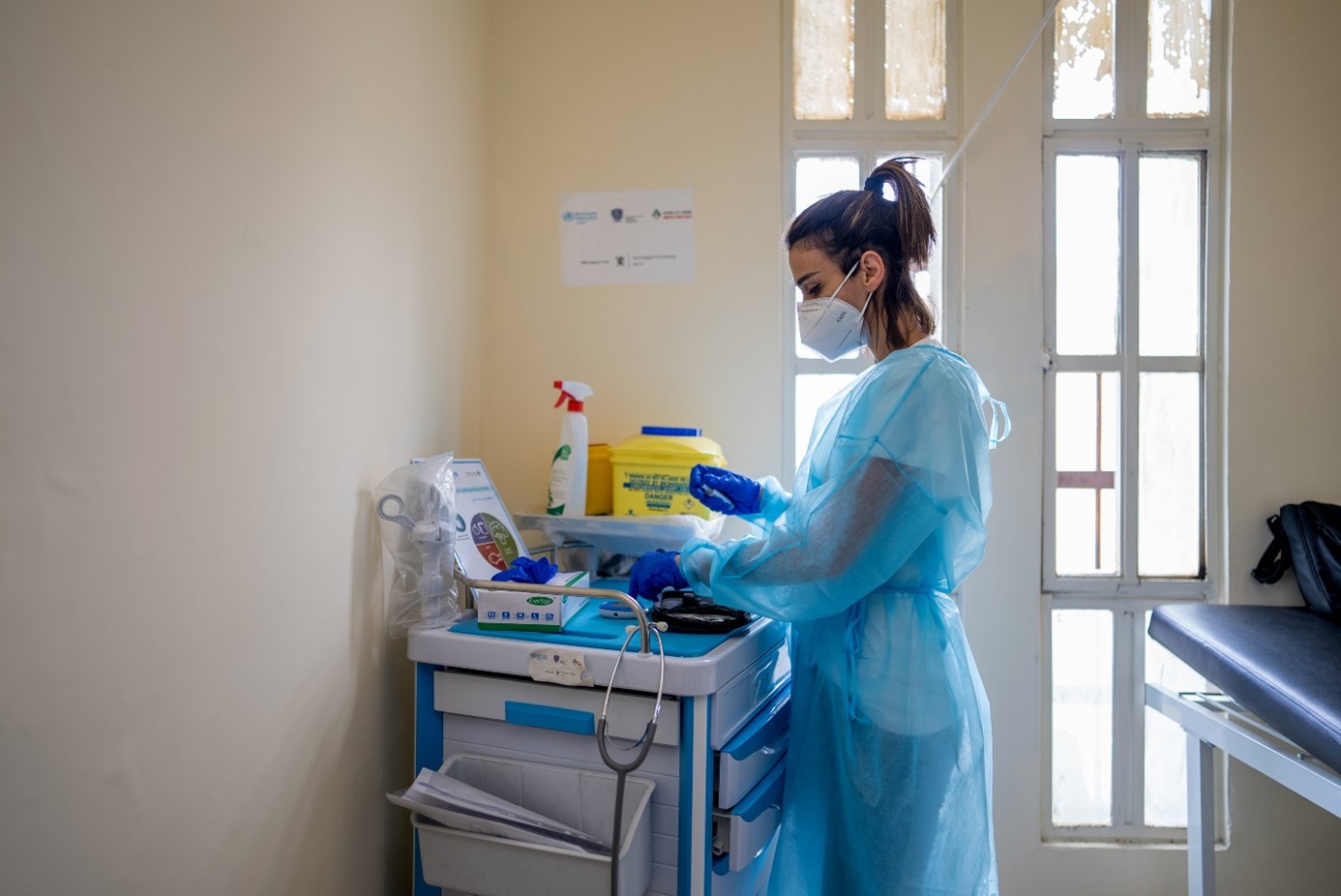
- Report -

Ukraine
Making every school a health-promoting school: global standards and indicators
author




- Improved access to quality essential health services irrespective of gender, age or disability status
- Countries enabled to provide high-quality, people-centred health services, based on primary health care strategies and comprehensive essential service packages
- Improved access to quality essential health services irrespective of gender, age or disability status
Improving health in Lebanon’s largest prison, so that no one is left behind
In recent years, Lebanon has been facing a range of political, socioeconomic, financial and health crises, leading to a rapid decline in infrastructure and energy supply, high levels of poverty and unemployment, and mass migration. The health system has been particularly stretched due to the departure of health care workers, the Syria crisis and the Beirut Port explosion. The Roumieh central prison, the largest in the country with 5,000 inmates, was particularly affected, with shortages of health personnel and medication, and challenges in managing the COVID-19 pandemic. In response, the World Health Organization (WHO) collaborated with the Ministry of Interior and Municipalities, with funding from the Royal Norwegian Embassy in Beirut, European Union and KfW (Germany’s state-owned development bank), to improve the health care system within the prison in the context of the COVID-19 pandemic. The project increased access to health services, improved quality of care and nutrition for inmates, and enabled the health clinic’s integration into the Ministry of Public Health’s primary health care (PHC) network, improving health outcomes immediately while paving the way for the future.
Key WHO Contributions
Situational assessment and strategy development
Adapting national health care protocols to the prison context and deploying and training a team of interdisciplinary health professionals to deliver health services
Development of food checklists and a menu tailored to prisoners’ nutritional needs
Renovating medical clinics and providing medical and information technology (IT) equipment
Supporting the development of an electronic medical file for prison inmates
Conducting project evaluation.
How did Lebanon, with the support of the WHO Secretariat, achieve this?
WHO Lebanon developed the project’s strategy in close consultation with the Ministry of Interior and Ministry of Public Health, aligning it with Lebanon’s health strategy. Its focus was to improve access to health and mental health services and nutrition in Roumieh central prison, targeting noncommunicable diseases and inmates aged 50 and over.
WHO recruited an interdisciplinary team of health care professionals, which included four family physicians, eight nurses, a social worker, a psychiatrist and an ophthalmologist, to provide health services. WHO provided the team with oversight and training based on national health care protocols adapted to the prison context. The team received regular training from WHO on protocols and forms, and on a people-centred primary care approach. They provided health education and conducted comprehensive health assessments and follow-up based on national health care protocols for the PHC level. By increasing the number of health workers, establishing a physician-patient relationship focused on partnership, inmate involvement in health care decisions, guaranteed confidentiality and informed consent, the project improved the quality of care delivered in Roumieh prison. Two thousand five hundred prisoners in Roumieh prison received a comprehensive health assessment, and more than 8000 consultations were provided in addition to continuous health education and awareness sessions.

A nurse recruited under the project supported by WHO in Roumieh prison prepares medical equipment for a consultation with a patient.
Photo credit: F. Choufany, WHO Lebanon.
WHO Lebanon renovated the medical clinics and provided essential medical and information technology (IT) equipment based on the minimum list of equipment for PHC centres. The equipment included exam tables, electrocardiogram and glucose monitors, blood pressure machines and spirometers. WHO Lebanon procured the equipment to ensure that the medical centre in Roumieh could be integrated into the Ministry of Public Health's PHC network, allowing inmates to receive sustained access to the same quality of health care as the rest of the population.
WHO Lebanon recruited a senior nutritionist who conducted a thorough assessment of the nutrition situation, including field visits, focus groups and meetings with inmates, Internal Security Forces (ISF) members and prison staff, as well as an analysis of the prison decree. The nutritionist then developed checklists for food safety and service and collaborated with prison officials to create a two-week menu tailored to prisoners with chronic diseases and those without specific health needs.
"The World Health Organization has been a steadfast partner for us, standing by our side since the early days of the COVID-19 pandemic. The expertise and technical support has been invaluable, helping us develop protocols and procedures to effectively combat the virus. WHO also conducted awareness campaigns to educate our staff and inmates about the risks and how to stay safe. We are grateful to WHO for their support and for helping us to manage the pandemic."
- Internal Security Officer in Roumieh prison, Ministry of Interior and Municipalities
WHO Lebanon, in partnership with other organizations and under the guidance of the Ministry of Interior and Municipalities, worked to develop an automated medical file for inmates in Roumieh prison. The project focused on general consultation and health care management. WHO Lebanon provided technical expertise and IT support, and capture-related forms and indicators. In preparation for operationalization of the system, WHO Lebanon also procured essential equipment such as desktops, printers and scanners.
"A great advantage of the automated medical file is its ability to provide access to the inmate's health file, allowing us to make informed decisions regarding their medical care. This information is crucial for transferring patients between locations. For example, a patient with a health condition that requires an air-conditioned vehicle can be quickly identified and transported safely.”
- Member of Roumieh prison Internal Security Forces
WHO Lebanon conducted an evaluation, which rate the project as relevant since it filled critical gaps in health care and was appreciated by inmates. Despite the complexity of crisis situations, such as those faced by Lebanon, there are opportunities to mobilize resources and collaborate among stakeholders. WHO’s project and support for Roumieh prison’s health care system was one such opportunity: it led to integration of the medical centre into the Ministry of Public Health's PHC network, providing a path forward for future collaboration and improved health outcomes and paving the way for more respect for human rights and basic needs.
- Improved access to quality essential health services irrespective of gender, age or disability status
- Countries enabled to provide high-quality, people-centred health services, based on primary health care strategies and comprehensive essential service packages
